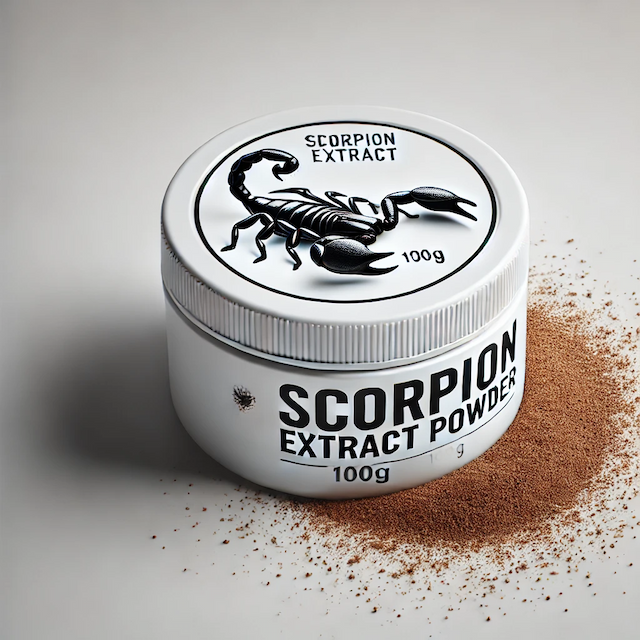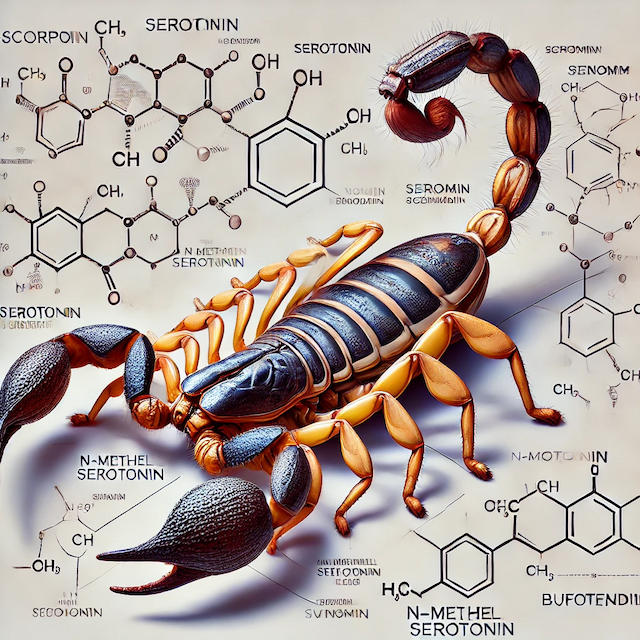The Therapeutic Potential of Dried Scorpion Venom
Omid Mehrpour
Post on 23 Nov 2024 . 9 min read.
Omid Mehrpour
Post on 23 Nov 2024 . 9 min read.
Have you ever wondered if something as fearsome as scorpion venom could help save lives? While most people think of scorpions as dangerous creatures to avoid, scientists see them as a treasure trove of medical potential. For over 400 million years, these ancient arachnids have roamed the Earth, armed with venom that’s now being studied for its unique healing properties. From fighting cancer to treating neurological disorders, dried scorpion venom turns heads in medicine. Let’s dive into how this surprising substance could one day revolutionize healthcare!

Cancer treatment remains one of the greatest challenges in medicine, but scorpion venom’s peptides and proteins provide hope. These compounds exhibit anti-proliferative, cytotoxic, and apoptotic properties, effectively targeting a range of cancers, including breast cancer, lung cancer, melanoma, and gliomas.

Inhibition of Tumor Growth: Proteins in the venom disrupt pathways critical for cancer cell survival, slowing tumor progression.
Induction of Apoptosis: Scorpion venom peptides trigger programmed cell death in malignant cells without harming healthy tissue.
Disruption of Metastasis: Venom components interfere with cancer cell migration and invasion, reducing the spread of cancer.
A 2014 study by Jian Ding and colleagues demonstrated that certain scorpion venom compounds suppress cancer cell proliferation by targeting specific signaling pathways. Similarly, Zargan et al. (2011) highlighted venom’s ability to inhibit glioma cell migration, showcasing its therapeutic promise in treating aggressive brain cancers.
Scorpion venom contains neurotoxins that target ion channels, integral to nervous system function. These toxins are being investigated for their ability to modulate neurological processes, offering hope for the treatment of neurological disorders like epilepsy, neuropathic pain, and even Alzheimer’s disease.
Sodium Channels: Venom neurotoxins selectively block overactive sodium channels, reducing chronic pain signals.
Potassium and Calcium Channels: Components modulate these channels, influencing neurotransmitter release and neuronal excitability.
A seminal study by Gwee et al. (2002) laid the groundwork for understanding how scorpion venom’s bioactive compounds affect the nervous system, paving the way for their use in neurotherapeutics.
The rise of antibiotic-resistant pathogens has intensified the search for novel antimicrobial agents. Scorpion venom peptides exhibit potent activity against various microorganisms, including bacteria, fungi, and parasites.
Broad-Spectrum Activity: Peptides from scorpion venom disrupt microbial membranes, leading to rapid cell death.
Novel Mechanisms: Unlike conventional antibiotics, venom components target unique microbial structures, reducing the likelihood of resistance.
Chaubey (2017) identified venom-derived antimicrobial peptides as promising candidates for developing next-generation antibiotics, particularly for multidrug-resistant infections.
Chronic inflammation underpins numerous diseases, from arthritis to inflammatory bowel disease. Scorpion venom contains non-disulfide-bonded peptides (NDBPs) with anti-inflammatory properties that may help manage these conditions.
Reduction of Inflammatory Mediators: Venom peptides suppress pro-inflammatory cytokines, alleviating symptoms of inflammation.
Immune Modulation: Certain compounds regulate immune cell activity, preventing excessive inflammatory responses.
Recent work by Javed et al. (2022) demonstrated the efficacy of scorpion venom peptides in reducing inflammation, positioning these compounds as potential treatments for autoimmune diseases.
Scorpion venom is not just a source of isolated therapeutic properties; its bioactive components serve as templates for drug development targeting various conditions.
Cardiovascular Health: Scorpion venom proteins regulate ion channels involved in heart rhythm disorders, offering potential treatments for arrhythmias.
Immune Modulation: Components are being adapted to create drugs that balance immune responses, potentially benefiting conditions like lupus and multiple sclerosis.
Ortiz et al. (2014) emphasized scorpion venom's role as a scaffold for drug development, demonstrating its versatility in creating synthetic analogs for clinical use.
While the therapeutic potential of dried scorpion venom is undeniable, several challenges remain:
Isolation and Optimization: Extracting bioactive compounds in sufficient quantities is labor-intensive and expensive.
Toxicity Management: Balancing therapeutic benefits with potential toxicity is crucial for clinical safety.
Regulatory Hurdles: The approval process for venom-based drugs requires rigorous testing to meet global standards.
Continued research and investment are essential to overcome these barriers. Interdisciplinary collaborations between toxicologists, pharmacologists, and biochemists will accelerate the translation of scorpion venom research into viable therapies.
One of the most remarkable aspects of dried scorpion venom is its extraordinarily high price in the global market. It is recognized as one of the most expensive substances in the world, and its value is driven by its difficulty of extraction, limited production, and immense medical potential.
Complex Extraction Process: Extracting venom from scorpions is labor-intensive and meticulous, often done using electrical stimulation. Each scorpion produces only a minuscule amount of venom (approximately 0.5 milligrams per extraction), requiring thousands of scorpions to produce even a small quantity of venom.
Medical and Research Applications: The demand for scorpion venom has surged due to its potential to treat cancer and neurological disorders and develop novel drugs. This drives up its value in research and commercial markets.
Rarity: Certain scorpion species with highly bioactive venom are found only in specific regions, making their venom particularly scarce. This geographic rarity directly influences its market price.
Dried scorpion venom can fetch prices ranging from $7,000 to $39,000 per gram, depending on the scorpion species, venom purity, and its intended application. For example, the venom of species like Leiurus quinquestriatus (commonly known as the "Deathstalker scorpion") is highly sought after due to its unique bioactive properties, often commanding much higher prices.
Research Laboratories: The highest demand comes from research centers and pharmaceutical companies that require pure, high-quality venom for drug discovery and development.
Long-Term Investments: Due to its scarcity and growing demand, dried scorpion venom has even been considered a luxury commodity in certain markets for speculative investment.
Strict Regulations: The trade of scorpion venom is heavily monitored in many countries due to environmental risks and ethical concerns related to animal rights.
Counterfeit Products: Given its high price, counterfeit scorpion venom is prevalent in the market, potentially compromising quality and efficacy.
Scorpion venom is a rich source of bioactive compounds being explored for various medical applications. These include treatments for cancer, neurological disorders, chronic inflammation, and microbial infections. Additionally, scorpion venom is being investigated as a scaffold for developing new drugs targeting cardiovascular and immune system disorders.
Yes, research suggests that certain peptides in scorpion venom can accelerate wound healing by promoting cell regeneration and reducing bacterial infection. These properties make it a promising candidate for treating diabetic ulcers, which are notoriously difficult to manage due to poor circulation and high infection risk.
Absolutely. Scorpion venom contains peptides and proteins with anticancer properties that inhibit tumor growth, induce apoptosis (programmed cell death), and prevent metastasis (spread of cancer). These compounds are effective against various cancers, including breast, lung, melanoma, and gliomas.
Yes, scorpion venom exhibits antimicrobial activity against a wide range of pathogens. Its peptides can disrupt bacterial and fungal cell membranes, leading to cell death. Research has also suggested potential antiviral properties, though more studies are needed to confirm its efficacy against viruses.
Scorpion venom is being investigated for its ability to target the Plasmodium parasite that causes malaria. Specific venom-derived peptides promise to disrupt the parasite's lifecycle, making it a potential tool in combating drug-resistant malaria.
Scorpion venom contains non-disulfide-bonded peptides (NDBPs) with strong anti-inflammatory properties. These compounds can suppress pro-inflammatory cytokines and regulate immune responses, making them potential treatments for inflammatory diseases like arthritis and inflammatory bowel conditions.
The unique structure of peptides in scorpion venom allows them to disrupt microbial membranes effectively, a mechanism different from traditional antibiotics. This reduces the likelihood of resistance development, positioning scorpion venom as a promising source of next-generation antimicrobial agents.
Yes, dried scorpion venom has shown potential in topical applications for wound healing. Its antimicrobial peptides can prevent infection, while other compounds promote tissue regeneration, making it ideal for developing external treatments for wounds and ulcers.
Yes, scorpion venom has demonstrated activity against yeast and fungal infections. The venom's peptides disrupt fungal cell walls, offering a potential alternative to traditional antifungal medications, especially for drug-resistant strains.
Yes, scorpion venom’s anti-inflammatory properties may help manage arthritis. By reducing inflammatory mediators and modulating immune responses, venom-derived peptides can alleviate pain and swelling associated with arthritic conditions.
From fighting cancer to combating antibiotic resistance, dried scorpion venom holds immense promise as a therapeutic powerhouse. Its unique bioactive compounds offer new avenues for addressing medicine’s most pressing challenges. However, realizing its full potential will require sustained research, technological innovation, and global collaboration.
By harnessing the power of scorpion venom, we can transform a natural toxin into a tool for healing—a testament to nature's incredible potential in advancing human health. Dried scorpion venom is a rare and valuable substance. Its exorbitant price reflects its medical potential and the challenges associated with its extraction and rarity. While the current cost is extraordinarily high, advancements in synthetic venom production may reduce prices in the long term, making this remarkable natural resource more accessible for widespread use.
© All copyright of this material is absolute to Medical toxicology
Dr. Omid Mehrpour (MD, FACMT) is a senior medical toxicologist and physician-scientist with over 15 years of clinical and academic experience in emergency medicine and toxicology. He founded Medical Toxicology LLC in Arizona and created several AI-powered tools designed to advance poisoning diagnosis, clinical decision-making, and public health education. Dr. Mehrpour has authored over 250 peer-reviewed publications and is ranked among the top 2% of scientists worldwide. He serves as an associate editor for several leading toxicology journals and holds multiple U.S. patents for AI-based diagnostic systems in toxicology. His work brings together cutting-edge research, digital innovation, and global health advocacy to transform the future of medical toxicology.
Ortiz, E., Gurrola, G., Schwartz, E., & Possani, L. (2014). Scorpion venom components as potential candidates for drug development. Toxicon, 93, 125 - 135. https://doi.org/10.1016/j.toxicon.2014.11.233.
Javed, M., Hussain, S., Khan, M., Tajammal, A., Fatima, H., Amjad, M., Zahid, A., Umer, M., Ali, S., & Yaqoob, M. (2022). POTENTIAL OF SCORPION VENOM FOR THE TREATMENT OF VARIOUS DISEASES. International Journal of Chemistry Research. https://doi.org/10.22159/ijcr.2022v6i3.204.
Ding, J., Chua, P., Bay, B., & Gopalakrishnakone, P. (2014). Scorpion venoms as a potential source of novel cancer therapeutic compounds. Experimental Biology and Medicine, 239, 387 - 393. https://doi.org/10.1177/1535370213513991.